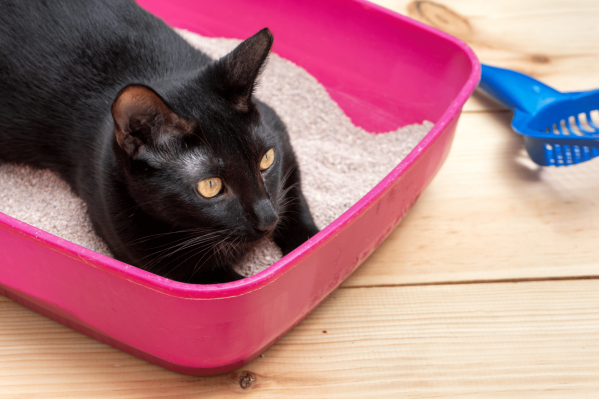If you’ve gone to the litter tray for a few days in a row and still haven’t found anything to scoop, your cat could be experiencing constipation. According to Dr. Yui Shapard, BVM&S MRCVS and medical director at Pawp, most cats will poop every 24-48 hours, but this can vary between individuals, as well as according to the type of diet they eat and their water consumption.
Small, dry, and hard stools inside or outside the litter tray may also be a good indication that your cat could be constipated. While some cats are more obvious when they are constipated (think loud meowing from their litter box that results from discomfort), others are quieter.
Dr. Shapard says that straining in the litter tray is also a good indication of constipation and commonly brought up by pet parents who bring their cats into the clinic after noticing it. However, it's very important to make sure that the straining is indeed due to constipation and not because they are straining to urinate due to a medical emergency called urinary blockage that is especially common in male cats. This is a potential emergency and is critical to differentiate between straining from constipation or straining from a urinary blockage. Cats that are unable to pass urine for 12 hours or more are possibly in a life-threatening situation and emergency intervention to relieve the blockage immediately is imperative for their survival.
What is constipation in cats?
Constipation means that there is an excessive build-up of stool in the colon, making it difficult for your cat to poop normally. The main function of the colon is to store and absorb excess moisture from the stools back into the body. If the stool stays in the colon for a very long time, too much moisture might be absorbed and this can lead to hard and dry poop. As a result, your cat might poop less frequently than they usually would, or there might be a complete lack of defecation.
It's not uncommon for cats that are constipated to be straining in the litter tray. This can cause abdominal pain if it is excessive. In some cases, as a result of the straining, a constipated cat will pass a small amount of liquid stool or blood and mucus which can easily be mistaken for diarrhea.
Signs your cat is constipated
Some cats are very discreet when they go to the bathroom and symptoms may be harder to detect, but some common signs your cat may be constipated include:
Hard, dry poop
Straining/yowling in the litter box
Lethargy
More frequent litter box trips (with nothing to show for it)
Hard or tense abdomen
Hiding
What causes constipation in cats?
Figuring out why your cat is constipated is essential. Constipation in cats can sometimes be a symptom of more serious underlying conditions which need to be treated correctly. Some of the more common causes for constipation in cats are the following:
Overgrooming - Cats tend to swallow hair when they are grooming. The hair moves through the gut and will get mixed with the rest of the stool. If a cat is overgrooming and swallowing an excessive amount of hair, or if it is a long-haired cat, hairballs can form which can lead to constipation.
Foreign bodies - Cats that like to hunt or that eat bones can become constipated.
Stress or anxiety - If your cat is stressed or anxious, they might be too scared to go to the litter tray and thus store the poop in the colon for longer, causing more moisture to be absorbed. They might also get stressed if the litter tray gets too full.
Obesity - Being overweight can lead to constipation.
Pain - Pain from a previous injury or arthritis, or even anal gland problems for instance, can prevent your cat from using the litter tray as needed and contribute to constipation. Pressure on the colon from a growth can also prevent them from pooping as they normally would.
Fiber - Too much or too little fiber in the diet can cause constipation in cats.
Dehydration - There are some serious medical conditions that can cause dehydration in cats. Examples are kidney disease, diabetes, and hyperthyroidism. Dehydration will result in the colon reabsorbing as much moisture from the stool as it can and lead to constipation.
Megacolon - This is a condition where the colon is stretched out and cannot contract properly to allow the stools to move. This is a serious condition and needs to be diagnosed and treated by a veterinarian.
It's essential for your cat to have a physical exam done if they struggle with constipation so the more serious causes can be ruled out and the cause can be treated. Treating the cause will also help prevent constipation in future.
Diagnosis of cat constipation
Constipation can sometimes be diagnosed by feeling the built-up stool in the colon. In overweight cats this can sometimes be difficult, and your vet might have to take x-rays to confirm constipation. This will also allow them to look at the pelvis, hip joints, and other structures around the colon.
Your vet might also need to do blood tests and a urine test to rule out other potential underlying causes.
Treatment for cat constipation
It may be tempting to try to treat constipation at home, but this should only be done once it has been established that your cat is definitely constipated and what the underlying cause for the constipation is. The treatment for constipation thus starts by taking your cat to your vet for a physical exam. Your vet will be able to make sure your cat has no other underlying medical conditions and will be able to give you the correct treatment for your cat’s specific needs.
Some commonly used treatments for cat constipation include the following:
Laxatives - Laxatives can be very helpful in the treatment of constipation, but should only be used under the direction of your vet. Cats can sometimes strain in the litter tray due to complications from diarrhea rather than constipation, and giving that cat laxatives will obviously just worsen the problem. There are also some over the counter human laxative products that can potentially be toxic to cats, so this should be avoided unless your vet tells you to use it.
Brushing - Brushing your cat regularly can reduce the loose hair in their coat so they swallow less hair. This is especially important in long-haired cats.
Litter tray care - Clean your cat’s litter tray regularly. It might also be a good idea to have a few different litter trays scattered around the house. Experiment with open and covered litter trays to see which one your cat prefers. You can also try different types of litter if your cat does not like the feel or even smell of a particular type.
Weight management and exercise - Monitor your cat’s weight to help prevent them from becoming overweight. Encourage exercise by providing different toys as well as areas where they can run and climb. This will help keep the bowels moving and will also relieve stress and anxiety.
Diet changes - You might need to try a different diet for your cat. Adding wet food will help increase the amount of water they consume. Adding fiber to the diet can help bulk up the stool and encourage colon contractions if poor contractility of the colon is the reason for your cat’s constipation. You can add fiber by adding some pumpkin or wheat bran to the diet. Other cats will actually need less fiber and a more easily digestible diet depending on the cause for their constipation. Most reputable food companies will also offer these types of diets, but speak to your vet before you change your cat’s diet.
As a reminder, don’t try any of these constipation treatments before you speak to a veterinarian, and they can ensure that you are taking the appropriate course of action to treat your cat.

Reviewed and fact-checked by
Dr. Mari, DVM at Pawp
